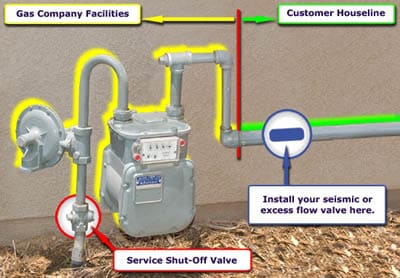In regions prone to seismic activity, earthquake gas shut-off valves are crucial safety devices designed to minimize the risk of gas leaks and fires following an earthquake. This comprehensive guide explores the importance of these valves, how they operate, and the benefits they offer to homeowners and communities.
Understanding Earthquake Gas Shut-Off Valves
The Basics of Gas Shut-Off Valves
Earthquake gas shut-off valves automatically shut off your home’s natural gas supply in the event of an earthquake. These valves are triggered by seismic activity and are essential in preventing gas leaks, which can lead to devastating fires and explosions.
Types of Earthquake Gas Shut-Off Valves
There are two primary types of valves: seismic-activated and excess flow valves. Seismic-activated valves respond to the ground shaking, while excess flow valves react to a sudden increase in gas flow, often caused by a ruptured pipe.
The Importance of Earthquake Gas Shut-Off Valves
Preventing Gas-Related Hazards
In the aftermath of an earthquake, damaged gas lines pose a significant risk. Earthquake gas shut-off valves help prevent gas leaks, which are a primary cause of post-earthquake fires.
Peace of Mind for Homeowners
Installing these valves provides homeowners with peace of mind, knowing that their property is safer from gas-related hazards following seismic events.

How Earthquake Gas Shut-Off Valves Work
Activation Mechanisms
These valves are designed to activate automatically during an earthquake. The seismic-activated valve responds to the physical movement of the ground, while the excess flow valve triggers when it detects a rapid increase in gas flow rate.
Installation and Maintenance
Professional installation is crucial for these valves to function correctly. Regular maintenance and inspections ensure they remain in good working order.
The Benefits of Installing Earthquake Gas Shut-Off Valves
Enhanced Safety
The primary benefit is enhanced safety. By automatically shutting off the gas supply, these valves significantly reduce the risk of fire and explosions following an earthquake.
Compliance with Safety Regulations
In many earthquake-prone areas, installing these valves is not only a safety measure but also a compliance requirement. This adherence can also positively affect insurance premiums.
Long-Term Cost Savings
While there is an upfront cost for installation, the potential cost savings in the event of an earthquake can be substantial, including reduced property damage and insurance costs.
Choosing the Right Earthquake Gas Shut-Off Valve
Factors to Consider
When selecting a valve, consider the type of building, local seismic activity levels, and specific safety requirements. Consulting with a professional can help determine the best fit for your needs.
Professional Installation and Testing
Professional installation and regular testing are crucial for ensuring that these valves function correctly and provide the intended safety benefits.
Conclusion
Earthquake gas shut-off valves are a critical safety feature for homes in seismic zones. By understanding their function, types, and benefits, homeowners can make informed decisions about installing and maintaining these life-saving devices. Investing in an earthquake gas shut-off valve is not just a matter of compliance; it’s a proactive step towards ensuring the safety and security of your home and loved ones.
Call Airloop Heating & Cooling to have one installed by our licensed professional at 1-833-Airloop, or Click here for an online request.


